PlayStation News Message Board older than one year ago
↕
Tomb Raider: Definitive Edition is often declared a passion project at Crystal Dynamics, and in my opinion it shows. Lara’s next-gen debut united three studios — leads from Crystal, longtime partner Nixxes, and Sleeping Dogs’ United Front Games — to usher Tomb Raider into a new generation of gaming.
Definitive Edition pairs the vision and artistry of the original release with technological improvements that allowed for a truly definitive experience, and one that only hints at what the future holds for Lara. We’re really eager to get Tomb Raider: Definitive Edition into your hands, or the hands of your friends if they’ve yet to venture to Yamatai. Below you’ll find a few words from the team thanking you for your support, and for spreading the word about Lara’s first journey on next-gen.
“Thanks in advance everyone! Enjoy the improved Lara!”
Mike Abahazy, Senior Technical Artist
“I just wanted to say thanks to all the TR fans out there — old and new! It was great fun working on the Definitive Edition. We worked our hearts out to deliver the best experience possible. We hope you like it!”
Kam Yu, Principal Artist
“We’re excited to have the game in everyone’s hands — whether it’s your first trip to Yamatai or a return visit, enjoy!”
Chris Johnston, Associate Brand Manager
“I’m especially proud of the cross collaboration between United Front Games, Nixxes and Crystal to bring you the best possible version of Tomb Raider game to Gen4 consoles. Enjoy!”
Brian Horton, Senior Art Director
“Hello, Tomb Raiders! This Definitive Edition is from all of us to all of you! We wouldn’t be here living the dream, and making great games without your faith, support, and passion for all things Lara.”
Scot Amos, Executive Producer

↕
We’re thrilled to announce our next CG animated film: Sly Cooper.
Based on one of PlayStation’s most beloved franchises, Sly Cooper is a kinetic and comedic heist film that tells the story of Sly Cooper, an orphaned raccoon thief, and the adventures of his childhood friends and partners in crime, Bentley Turtle and Murray Hippo. In the film, Sly learns that he comes from a long line of talented, international thieves, and is catapulted into a global adventure. Sly races to reassemble pieces of an ancient book holding the Cooper clan’s family secrets before it can fall into the hands of Clockwerk — an evil metallic owl bent on ending the Cooper family line.
In the trailer, what really stands out to us — and most likely to the fans — is the change in the look of the characters and the world.
When we met with PlayStation to discuss the film last year, we proposed that the CG art style would transfer best in the leap to the big screen. Both PlayStation and Sucker Punch Productions (the original creators of the franchise) were kind enough to give us the chance to make this idea a reality. After a few months of development, the team at Rainmaker, along with Director Kevin Munroe, nailed it. Well, kind of…
The modeler gave Murray the wrong helmet, which was more like a motorcycle helmet — funny, but definitely NOT his signature one. And while we all loved the temp music track — which happened to be the theme to Mission Impossible — that music would have cost us a fortune to license. With those quirks worked out, we’re excited to bring you this first look and hope you enjoy it.
The Sly Cooper release is slated for 2016. The film will also be released in 3D for those who want to feel like they’re in the actual Sly Cooper world.
Oh, and be sure to follow us online at our website and on Twitter — we’ll be releasing a 3D version of the teaser soon.

↕

↕

↕

↕

↕

↕
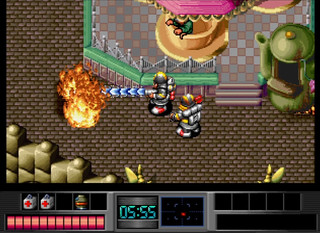
The third week of the MonkeyPaw Games Retro Rush is all about a pair that works well together. Like salt and pepper, peanut butter and jelly, or cocoa and marshmallows, Pete and Danny are inseparable as a firefighting team that work together like clockwork.
What’s the Retro Rush? Each week, for six weeks, we’ll be releasing a new import PSone Classic on PlayStation Store for PS3, PS Vita, and PSP. So far, we’ve brought Double Dragon and Lucifer Ring to PlayStation Store, and a firefighting duo is about to join the Retro Rush with The Firemen 2: Pete and Danny.

In The Firemen 2: Pete and Danny, the titular heroes arrive on the scene of a theme park that’s burning to the ground. People are trapped and fire is running wild, there’s pandemonium all over the place. Pete and Danny answer the call and head into the blaze to rescue civilians. Oh, did we mention the game also takes place on Christmas Eve? Talk about a stressful day. The good news is you can bring a friend into the chaos since The Firemen 2: Pete and Danny is a local co-op game.
What makes this game one of the quirkiest titles we have ever released is the fact that this is an action RPG firefighting game. The key difference from a traditional action RPG is that you won’t find giant rats or balls of sentient goo to battle — the enemy you face is fire. Fire will come in all shapes and sizes and you’ll need to plan the best method of attack so you don’t get overwhelmed.
Between the unique gameplay and the co-op mode, The Firemen 2: Pete and Danny will be an awesome addition to your import collection. You can download The Firemen 2: Pete and Danny starting tomorrow, January 28th, for PS3, PS Vita, and PSP.
The Retro Rush will continue next week with a game that makes it a sport to climb tall, tall structures. Get ready to go bananas — Hyper Crazy Climber is coming in Week 4 of the Retro Rush.
The Retro Rush is halfway to the grand finale! Which Retro Rush titles are you playing? Find MonkeyPaw Games on Twitter at @MonkeyPawGames and let us know.

↕
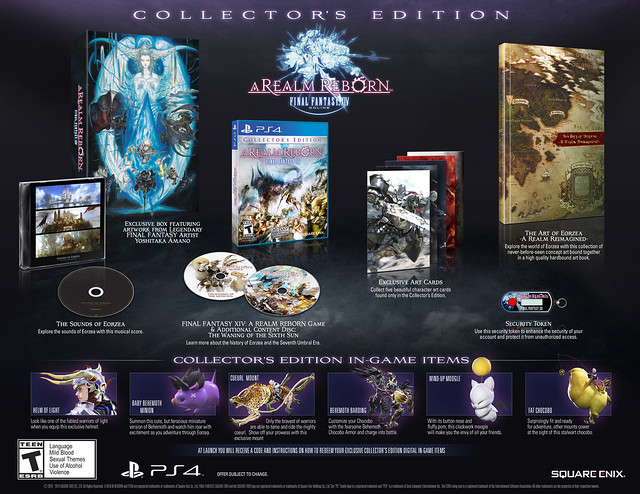

Since Final Fantasy XIV: A Realm Reborn, the second MMO in the Final Fantasy series, was released on PC and PS3 , more than 1.5 million accounts have been registered, and filled more than 60 worlds with a living, breathing community. And since then, PS4 has been released, and millions of you have welcomed the new console into your homes. But admit it — you felt that something was missing, didn’t you?
Final Fantasy and PlayStation have been a dream team since the early days, and good friendships never die. So we’re happy to announce that Final Fantasy XIV: A Realm Reborn will begin beta on February 22nd, and then launch on April 14th.
But that’s not all. What would Final Fantasy be without a sumptuous Collector’s Edition? If you want to know more, read on!
You will defend the realm of Eorzea against a smorgasbord of enemies — no, I’m not even kidding, you should be happy if something doesn’t constantly try to snap you in half or just save itself the trouble and swallow you whole to begin with. In a world like this, an adventurer needs any help he can find.
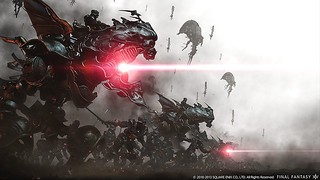
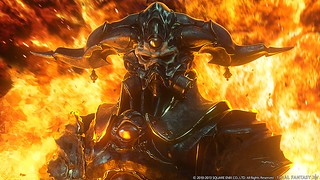
And instead of the standard version, which gets you the game and 30 days of game time, there’s also a unique Collector’s Edition, which will look great in your collection. It features art, music and movies you can proudly show off to your friends, but also offers you the support every professional adventurer needs in the form of in-game items!
The Collector’s Edition contains these physical items:
- Final Fantasy XIV: A Realm Reborn exclusive box
- Final Fantasy XIV: A Realm Reborn artbook — The Art of Eorzea: A Realm Reimagined
- Final Fantasy XIV Seventh Umbral Era movie disc — The Waning of the Sixth Sun
- Final Fantasy XIV: A Realm Reborn soundtrack — The Sounds of Eorzea
- Final Fantasy XIV: A Realm Reborn art card set
- Final Fantasy XIV: A Realm Reborn themed security token
As well as some sweet, sweet in-game items:
- Fat Chocobo Mount
- Coeurl Mount
- Behemoth Barding for your Chocobo Mount
- Wind-Up Moogle Companion
- Baby Behemoth Companion
- Helm of Light (increases your earned experience by 20% until level 10!)
My personal favourite? The Fat Chocobo Mount! Ample, soft space to sit on, huggable, and even when you’re trapped in an icy chasm, you can be sure that he’ll find his way to your next meal — even if he has to peck himself through 50 yalms of pure ice, dangit! The true survivalist’s choice.
So, what are you waiting for? The pre-orders start now. And if you’re still not convinced, keep your eyes peeled on this space — we’ve got more to share, soon!

↕


An iconic video game hero receives a herculean upgrade this week in the world of PlayStation. Legendary adventurer Lara Croft returns in Tomb Raider: Definitive Edition, which launches Tuesday on PS4.
Originally released on PS3 last year, this reboot showcased the breathtaking and brutal origin story of a gaming great. But the team at Crystal Dynamics wasn’t satisfied with its already critically-acclaimed project. The developers doubled back and addressed every detail, making huge technical overhauls to take advantage of PS4′s hardware. The result? A visually stunning adventure, all displayed in native 1080p and running at a silky smooth framerate.
For a complete list of the new releases, read on, and enjoy the Drop!
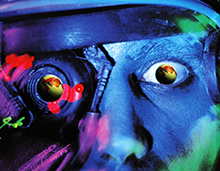
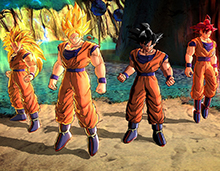
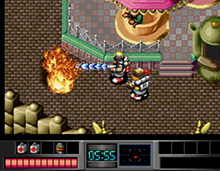

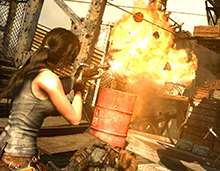 New PlayStation Releases This Week
Cyber Sled
PSone Classic — Digital
The arena awaits you. Prepare for action, and jump into your Battlesled to face the competition with powerful weapons at your disposal. Grab power-ups, and stay frosty.
Dragon Ball Z: Battle of Z
PS3, PS Vita — Digital (PS3 Version Available at Retail)
The first new Dragon Ball Z game in more than 2 years, Battle of Z showcases awe-inspiring team battles where groups of four warriors face other groups in massive battles. Challenge players from around the world, and select a dream team of Z warriors to devastate your opponents.
The Firemen 2: Pete & Danny
PSone Import — Digital
A unique action RPG import from the team at MonkeyPaw Games. This cooperative multiplayer game thrusts players into a burning theme park in order to rescue civilians. Fire is your enemy here, and it comes in all shapes and sizes. But Pete and Danny are more than up for the task.
Mark Davis Pro Bass Challenge
PS2 Classic — Digital
Dive into fierce fishing tournaments and work your way up to the top to compete against fishing master Mark Davis. Unlock the latest tackle equipment to snag the biggest catches.
Tomb Raider: Definitive Edition
PS4 — Digital, Retail
Not just your everyday upscale. Lara Croft’s critically-acclaimed origin story launches on PS4 with striking visual upgrades and control enhancements. Rediscover the introduction of a gaming icon, and explore dangerous environs while fighting to survive.
New PlayStation Releases This Week
Cyber Sled
PSone Classic — Digital
The arena awaits you. Prepare for action, and jump into your Battlesled to face the competition with powerful weapons at your disposal. Grab power-ups, and stay frosty.
Dragon Ball Z: Battle of Z
PS3, PS Vita — Digital (PS3 Version Available at Retail)
The first new Dragon Ball Z game in more than 2 years, Battle of Z showcases awe-inspiring team battles where groups of four warriors face other groups in massive battles. Challenge players from around the world, and select a dream team of Z warriors to devastate your opponents.
The Firemen 2: Pete & Danny
PSone Import — Digital
A unique action RPG import from the team at MonkeyPaw Games. This cooperative multiplayer game thrusts players into a burning theme park in order to rescue civilians. Fire is your enemy here, and it comes in all shapes and sizes. But Pete and Danny are more than up for the task.
Mark Davis Pro Bass Challenge
PS2 Classic — Digital
Dive into fierce fishing tournaments and work your way up to the top to compete against fishing master Mark Davis. Unlock the latest tackle equipment to snag the biggest catches.
Tomb Raider: Definitive Edition
PS4 — Digital, Retail
Not just your everyday upscale. Lara Croft’s critically-acclaimed origin story launches on PS4 with striking visual upgrades and control enhancements. Rediscover the introduction of a gaming icon, and explore dangerous environs while fighting to survive.
The information above is subject to change without notice.

↕
Hey everyone! I hope you’re having a great, game-filled weekend.
OlliOlli came out on Tuesday, and I don’t know about you but it’s literally the only thing I’ve been able to play all week long. By the way, I wrote a handy tips guide, for newcomers and advanced players alike! I hope you like it ~
The PS Vita PLAY sale is in full effect, nabbing you extra discounts if you buy more than one of the included games: OlliOlli, Dragon Ball Z Battle of Z, Dustforce(!!!) and TxK. Ryan went hands-on with the upcoming Strider reboot on PS4, Square Enix deployed a fresh demo for Lightning Returns: Final Fantasy XIII and more.
I’m gonna go ahead and say this week’s Blogcast is a good one, too. Go listen to it.
What are you playing? (Say OlliOlli.)
- I’m playing: OlliOlli, OlliOlli, OlliOlli
- I’m watching: Dredd (SO. GOOD.)
- I’m listening to: Tearaway Soundtrack, Dustforce Soundtrack
This Week’s PlayStation Store Update

This Week’s PlayStation Plus Update

PlayStation Blogcast 106
Most-Watched Video of the Week

↕

↕

↕

↕

↕

We’re back! While I continue to explore the nerve-jangling depths of Dark Souls, the rest of the Blogcast cast rewinds time to chat about all sorts of old favorites. Plus: A major PS4 release highlights the new PlayStation releases for January 28th, we debut a voicemail you can’t afford to miss, and end with an especially sneaky Mystery Theme. Not too shabby!
Subscribe via iTunes or RSS, or download here
Stuff We Talked About- OlliOlli
- Tomb Raider: The Definitive Edition
- Dark Souls
- EDF 2025
- Basement Crawl
- New goodies in The Playroom
- Our good friend Bill Dafoe
- A very interesting voicemail
- Episode 105: Games of Future Past
- Episode 104: Now We’re Talkin’
- Episode 103: Yep, It’s a Clip Show




- Sid Shuman – PlayStation Social Media Manager
- Nick Suttner – PlayStation Account Support Manager
- Justin Massongill – PlayStation Social Media Specialist
- Ryan Clements – PlayStation Social Media Specialist
[Editor’s note: PSN game release dates are subject to change without notice. Game details are gathered from press releases from their individual publishers and/or ESRB rating descriptions.]
- Thanks to Cory Schmitz for our beautiful logo and Dormilón for our rad theme song and show music.

↕

↕

↕
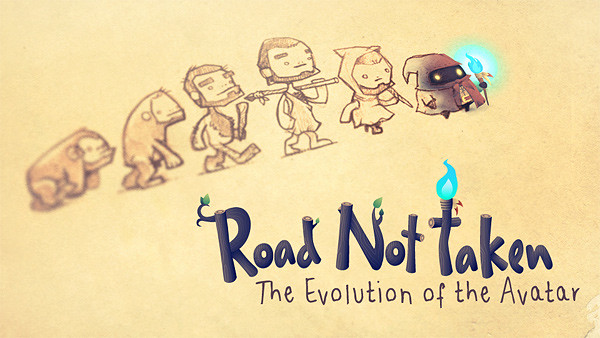

Hi everyone! I’m Brent, the lead artist for Spry Fox’s upcoming PS4 & Vita game, Road Not Taken. We’ve gotten a lot of questions and compliments about the look of the game’s main character, so I thought you might enjoy reading about the process I went through in creating it!
First, I guess I should say that designing a game’s main character/avatar is always tricky. The avatar has to work as a functional asset within the context of the game, has to look good in marketing materials and screenshots, but most importantly, has to feel right as something that represents you, the player! Easier said than done.
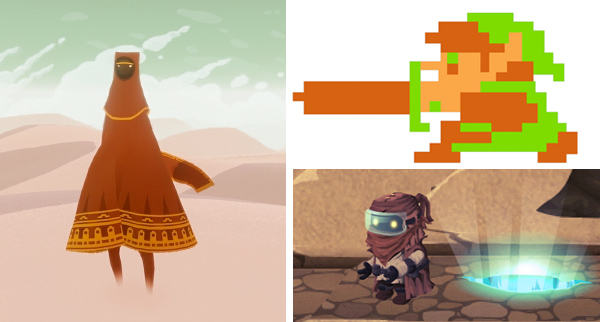
In Road Not Taken, the main character is a forest ranger of sorts (who happens to be blessed with mystical powers of levitation). Although the theme of the game superficially calls for it, I knew right off the bat that I didn’t want to go with a typical “park ranger” motif. The forest of Road Not Taken is mysterious and enchanted, and I wanted the Avatar to have the same vibe. So instead, I drew inspiration from more delightful/whimsical figures. Some of my key inspirations include:
- I had the great pleasure and fortune of working with Robin Hunicke (Journey) in the past. (Hell yeah, name drop!) Her philosophies and discussions on aesthetics and her talks on the creation process of Journey has always carried a huge level of inspiration in my works and has carried over into design decisions made in Road Not Taken in a big way.
- As a tile-based game, Road Not Taken demands characters that are generally 1:1 in ratio to comfortably sit in a given cell. Like many 8-bit tile games (Zelda, Lolo, Bomberman), you’re not afforded a multitude of sizes and scale to play with when designing within the confines of a grid. 8-bit design serves as big inspiration in communicating so much with so little.
- I was previously the Art Director on an MMO called Glitch. I created hundreds of NPCs for the game, but one of them that stuck with me was the Smuggler character. I always wanted to use him again for something, so when it came to designing the characters for Road Not Taken, he was one of the first characters I dug out of the ol’ brain archives to re-iterate on. (Wait… did I really just reference myself as a point of inspiration?? Tsk tsk. Shameful.)
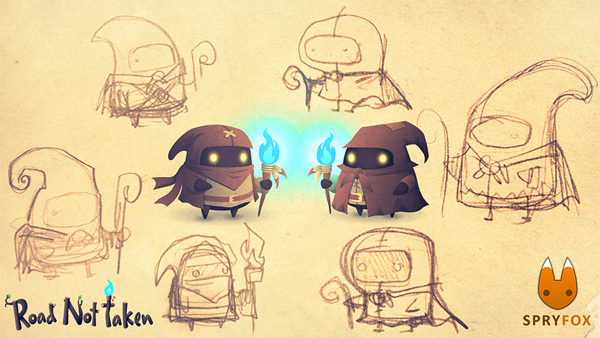
The general look of the avatar hasn’t changed a whole lot from its earliest sketches to its current iteration. I knew I wanted the main character to be holding a staff to signal a “lone traveller” persona. And I knew s/he needed to be hooded to hide his/her gender, so everyone could identify with the main character.
But when dealing with a character of such a stout stature that a tile-based game calls for, nailing down the overall shape of the character is everything. You could see by the early sketches and prototypes that the general theme and look of the character did not change through the process. Almost all of my sketches and concepts were iterations on the character’s head/hood shape and size. I was barely concerned about what was inside this silhouette until I was settled on the shape. In the end, I wanted the character to be whimsical — almost elven or wizard-like — yet still remain human in nature.
The blue flame was one of the last elements I added to the design, and I did it for three reasons. One, to give him a signature element to elevate him from being just “some hooded dude”. Two, for thematic purposes: the flame acts as the character’s life meter. When the flame dies, so too does our hero. And three, because why not a blue flame?
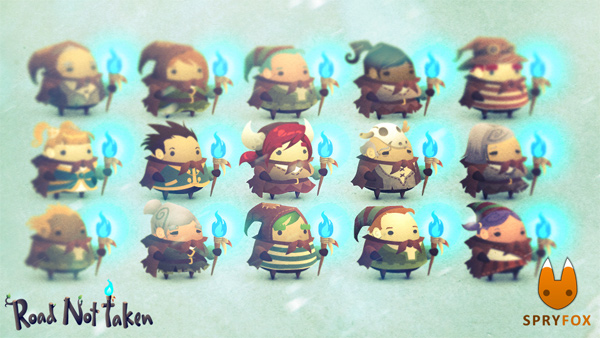
So, what’s under the main character’s hood? We are currently experimenting with having the player reveal themselves to townsfolk. (Get your mind out of the gutter; I don’t mean it like that!) There are currently hundreds of possible avatar combinations, and we are working on allowing the player to have the option of fully customizing their character. Above is a sneak peek at some of the possible combinations! Which one are you?
I hope this glimpse into the artistic development process behind Road Not Taken has been interesting to you. If you have any other questions about the look and feel of the game, please leave me a comment and I’ll do my best to answer. And if this is your first time hearing about the game, please check out some of the video teasers that we’ve previously released here on the PlayStation.Blog!

↕
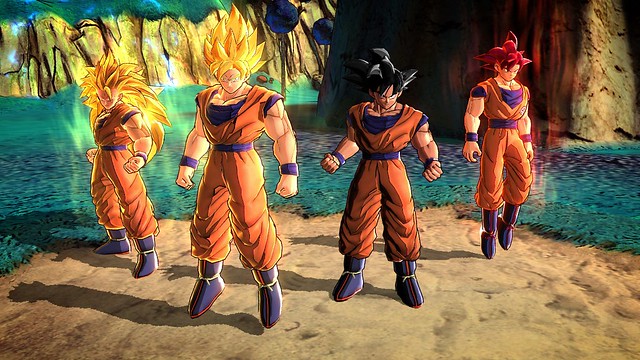

Dragon Ball Z: Battle of Z is the first entirely new Dragon Ball Z game in over two years, and it launches next week, January 28th, on PS3. It comes packed with a number of attractive features, including team battle and co-op missions. It also allows players to create their own team of up to four players.
The game’s battle system has also evolved from a “one-on-one” setup to more team battle focus. Furthermore, this is the first Dragon Ball Z game that allows players to enjoy co-op battles with players from around the world through an online multiplayer mode. Of course, a Dragon Ball Z game also has to feature epic battles against gigantic bosses on huge 3D maps.
Dragon Ball Z: Battle of Z features an enormous roster of Z warriors. With up to 8 characters gathering in a one place to do battle, players can never let their guard down during the intense action. With so many warriors fighting at once, these battles will surely give players a sense of camaraderie in hyper-fast gameplay.
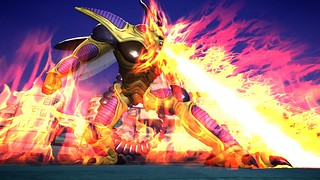
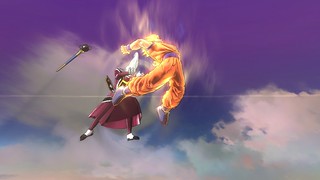
In Dragon Ball Z: Battle of Z, everyone will be able to create their favorite Dragon Ball Z team; perhaps your “dream team” is made up of Goku, Frieza, or Yamcha. For me, it was really fun to see and play with all Yamcha on my team and fight against other mighty Z warriors. These crazy mash-ups are truly unique to Dragon Ball Z: Battle of Z.
For fans that love to play with character abilities, they can now be greatly increased through customization via cards. Players can also expand upon their battle style by changing Regulations in the online team battle settings. By changing the settings, you can fight against one other player and have the A.I. control the rest of the characters.
Finally, Dragon Ball Z: Battle of Z is a challenging title that takes players through Dragon Ball Z game history. If you or your friends are interested in trying out this game, please download our free demo on PlayStation Store. The demo will allow you to play the first four missions from the final game; you can also enjoy online team battles against other players playing the demo!
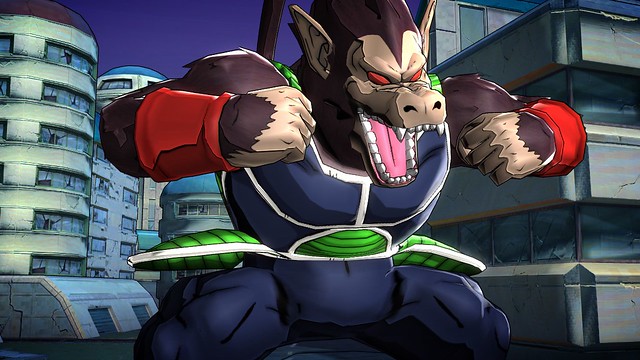
But the best part of the demo: you can carry over most of your demo save data to the final release version of the game, so you can continue playing from where you left off in the demo version.
On behalf of the Dragon Ball Z: Battle of Z development team, I want to thank our fans for their support. And in the spirit of Dragon Ball Z: Everyone… GIVE ME SOME OF YOUR ENERGY!

↕
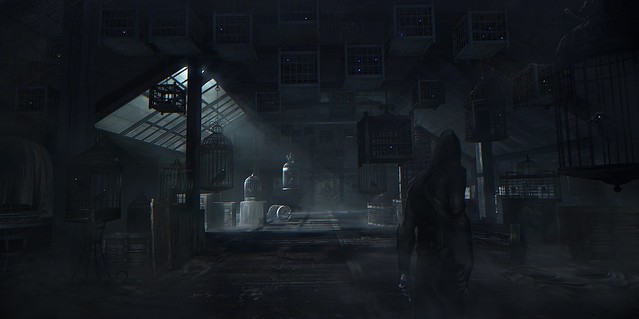

Garrett snuffs out a candle flame as he stalks through the closed jewelry shop, inches away from a snoring guard. While the jeweler toils in his basement and his wife basks by the fire, Garrett slips silently from room to room, rifling through drawers and pocketing valuable trinkets. Thief on PS4 is at its best when Garrett is left to his own devices, enabling players to vault through windows and pry open cabinets as the master thief himself.
This reboot of the classic stealth series takes a more open-world approach as players prowl the alleys and rooftops of The City, a shadowy nexus bathed in perpetual twilight. The City itself is a visual delight, steeped in long shadows and wavering fires that turn every nook and cranny into a sneaky play space.
And Thief’s thieving feels tactile. Coins, jewelry, and other collectibles litter cabinets and line hidden vaults, providing ample motivation for completionists to search every corner and crevice. The more loot you collect, the more resources you’ll be able to buy.
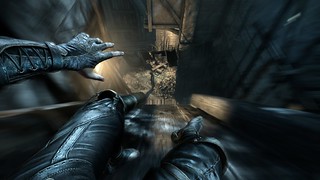
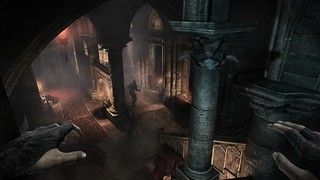
One resource worthy of investment is Garrett’s trusty bow, which supports many arrow types — some for extinguishing flames, others for stunning patrols with toxic vapors, and still others for knocking over vases or turning off light switches from afar. In a pinch, you can use lethal broadhead arrows to take out a guard, but it’s a risky move that could draw unwanted attention. These items are easy to access: just slide a finger over DualShock 4′s touchpad and click on the desired tool.
Like its predecessors, Thief offers a wealth of different play opportunities for each and every mission. Take, for example, the aforementioned scene in the jewelers. Some players may practice patience and timing to move through the environment unseen. Others may silently dispatch the guards with Garrett’s handy club before proceeding. Others may extinguish every light and use the shadows to their advantage. Each play style is wholly valid, and rewarded at the end of the mission with bonuses.
There’s much more to appreciate in Thief outside of its stealth systems and flexible play. Eidos Montreal has put tremendous effort into detailing the world and its story. Hallway tables are piled high with trinkets. Beggars reach out at Garrett with feeble hands. Guards mutter during patrols and complain about their love lives.
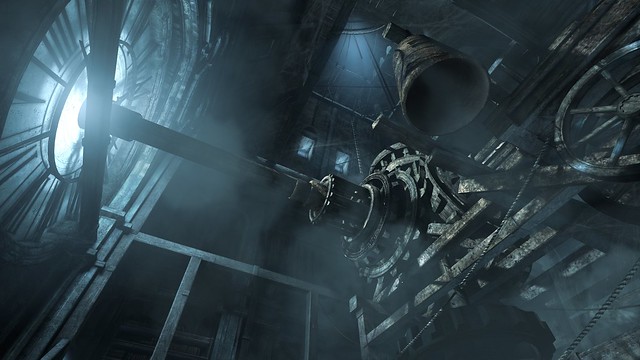
This attention to detail extends into play as well. Garret’s arms will begin to falter if his bow is drawn for too long, reducing accuracy. Newspaper clippings reveal additional narrative elements once collected. The lightbar grows in brightness when Garrett is exposed. And even Garrett’s trinkets (stat-boosting items) have stories to tell. The Cross-Wind Medallion, for example, reduces the chance of being hit by enemy projectiles. In its description, it tells of its previous owner, Silent Joff — a “long-dead archer who never spoke and never missed.”
Details such as these lend Thief authenticity, and make Garrett’s adventures all the more immersive from mission to mission. For those gamers that delight in keeping to the shadows and snatching up glittering loot, Thief launches on February 25th for PS4.

↕

↕

↕

↕

↕

↕

KAZ: Pushing the Virtual Divide, a documentary film chronicling the life of Gran Turismo series producer Kazunori Yamauchi, will premiere for Amazon Instant Video, Crackle, and other video streaming services on February 5, Sony announced this week.
Directed by Tamir Moscovici (Urban Outlaw, Painting Coconuts), KAZ explores the creation of the Gran Turismo series in the context of Yamauchi's lifelong fascination with cars and racing. The film focuses on Yamauchi's "relentless willingness to challenge himself, to hold none of his past achievements sacred, and push beyond the virtual divide in his pursuit of perfection."
The documentary will also begin airing on the Sony Movie Channel starting next month, and will be available for download from the Sony Entertainment Network. KAZ launched this week as a Hulu exclusive.

↕

↕
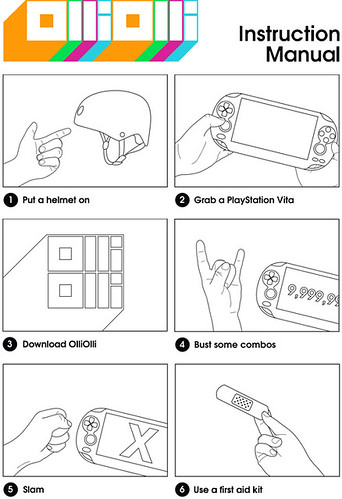
OlliOlli is out now on PS Vita, and it’s getting praise from reviewers left and right. Newcomers might be put off by its simple, yet highly skill-based trick and landing system, but before long the urge to nail longer (And riskier!) combos will keep you glued to your Vita for hours on end.
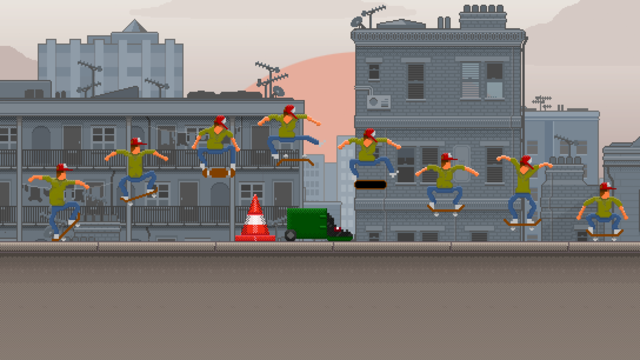
I’ve spent about a week with OlliOlli, during which I’ve picked up a few tricks for maximizing one’s scoring potential on any given stage. This list is by no means comprehensive — these are just notes I’ve taken over the course of the last week. If I’ve missed anything, or if you’ve got your own tips, leave ‘em in the comments! Oh, and good luck on that Daily Grind.
Timing is everythingFrom the moment you first boot up OlliOlli, you need to know that timing your landings and grinds properly is integral to not only getting chart-topping scores, but even finishing stages and completing goals. A perfect grind will actually give you a small boost in speed, which you’ll need in a few later stages to clear otherwise impossible gaps. Keep this in the front of your mind as you play the game — focus is essential.
Get greedySure, you can meander through a level sticking to basic tricks like kickflips and shove-its. This is actually a good strategy for wrapping up goals that require you to collect items and make it to the end of the level. However, if you want to rock that #1 spot, you must embrace the greed. Never play it safe, and take every risk the game presents you with. The longest, most dangerous combo you can pull off will always be the most lucrative. Pack as many spins, flips, and grinds into one combo as you can, and avoid the ground at all costs.
 Keep it fresh
Keep it fresh
Once OlliOlli’s controls start to become second nature, muscle memory can take over and you’ll find yourself settling into a routine with your tricks. This can end up betraying you, for two reasons. One: tricks yield less points the more you repeat them, so a more mixed-up repertoire will result in higher scores. Two: some tricks take longer to pull off, and if you miss a grind because you’re still in the middle of a trick, it usually means your face is about to meet the ground.
Have a planYour first attempt at a stage is usually not going to be a good one. Plan to dedicate your first couple runs to learning the level — and I don’t just mean where the grinds and jumps are. Figure out how many spins you can cram into each jump. Study the space between grinds and obstacles so you know when you want to stay on a rail until the end and when you want to launch off early. And remember, more complex flip tricks take longer to execute, so if you’re ever jumping to a rail that’s higher than you are, you’ll probably want to stick to kickflips and heelflips.
… But don’t be afraid to change your mindJust because you’re charging a kickflip doesn’t mean you’re committed to it. You can move the left analog stick to a different position to start charging a different trick with no consequence — just don’t let the stick return to its neutral position or it’ll trip the trick you were originally charging. For instance, if you’re holding right to charge a kickflip, but you want to do a heelflip instead, move the stick in a half-circle to reach charge left, rather than flicking the stick across the middle of its neutral zone and triggering the trick. This goes for spins too: if you’re holding L, there’s no punishment for letting go of it or switching to R instead.
Study your TricktionaryTapping the little book icon in the top right of your screen when flipping through stages or looking at a level’s goals will pull up your Tricktionary: a guide to OlliOlli’s multitude of moves. It’s split between flip tricks and grinds, and you’ll want to know how to do most of them. As we addressed above, executing different tricks will result in more points, so it’s important that you keep at least a dozen or so in your back pocket. Pay attention to how long each trick takes to perform, too — knowing the timing difference between a 360 hardflip and a bigspin could save your run.
Multiply!It’s important to do high-scoring tricks, but it’s more important to pump up your multiplier value. Flip tricks will net you points, but spins will crank up your multiplier. Grinds are especially important, as they’ll score you big points and an upgraded multiplier. And, to reiterate: timing is everything! A perfect grind bumps your multiplier up two notches, while a standard grind only gets you an extra 1x.
More grinds > long grindsTo build on the “Hey, get big multipliers” point, if you’re on a long rail try to sneak in two separate grinds rather than one long one. You can usually bash out a bigspin flip or the like in between grinds, too, resulting in a far larger haul than you’d pull in with one long grind.
All tricks are not created equalWhile variety is important, there are a few tricks that, in my experience, should be your bread and butter for most runs. Your frontside bigspin, backside bigspin, bigspin flip, and bigspin heel are very valuable tricks, because they’re flip tricks with spins built into them. You can keep holding the shoulder button down after the trick is finished to keep spinning too, netting you more points and, more importantly, bigger multipliers. Once in a while, it’s a good idea to toss in an impossible or a 360 hardflip, as those base tricks will secure large point values. Just remember, those take a while to complete, so wait until you’ve got a big jump ahead before you go for it.
Rotate, rotate, rotateWhen you start playing OlliOlli, you can approach learning the game one of two ways: get your flip tricks down, then work on integrating rotations, or go full-hog from the get-go and start busting out crazy spinny tricks right away. Either way, you should keep your index fingers resting on those shoulder buttons at all times, because every rotation you execute nets you a few extra points and an additional bump to your multiplier. Oh, and you’ll spin faster if you aren’t doing a flip trick at the same time. Use that information as you will.
Listen to the game’s adviceWhen you start each stage, a screen appears that details all the goals for that level. At the bottom of this screen is a tip, which is usually related in some way to at least one of the goals for that area. Pay attention!
Play with headphonesPartly because it’s a bit easier to get your timing right if you can hear the game’s audio cues for jumping, grinding and landing, but mostly because the soundtrack is freakin’ killer.

↕
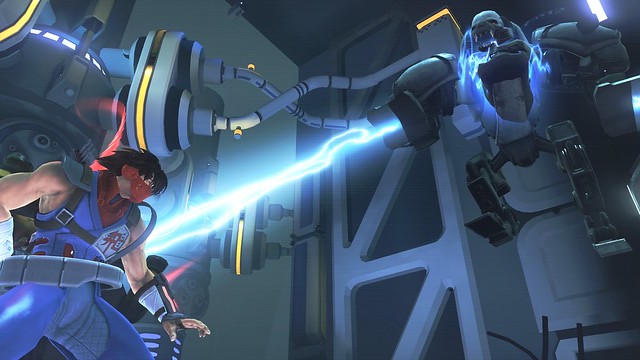

The wintry streets of Kazakh City are teeming with soldiers, automated sentry turrets, and terrified citizens. This striking blend of Russian architecture and dystopian elements set the stage for Strider, which launches for PS3 and PS4 next month. When we first saw Strider running last year, we enjoyed an early look at the PS3 version. This time the PS4 version took the spotlight.
Set in an alternate future of Earth, the world is ruled by the mysterious Grandmaster Meio. Hiryu, the youngest recruit of the Strider program, accepts the mission to eliminate Meio and end his tyrannical supremacy. Hiryu arrives in Kazakh City and is quickly engulfed in conflict.
At its core, Strider is a side-scrolling action game with breathless combat and a near feverish pace. Players explore Kazakh and earn upgrades and powers along the way, which in turn enable them to access more areas of the map. All the action revolves around Hiryu, who blazes across rooftops, over wires, through buildings, and down walls with an absolute dominion over fear. Anything that stands in his way gets sliced to ribbons by his indestructible plasma weapon, the Cypher.
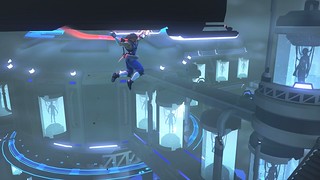
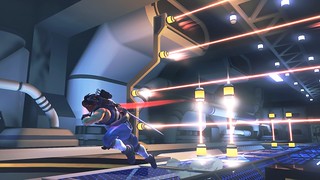
The PS4 version of Strider runs about as smooth as Hiryu does (read: smooth). As players traverse the environment and cut up the opposition, the screen explodes with light effects, smoke, laser fire, and the sizzling remnants of fallen soldiers. The tension rarely lets up, and keeps a breakneck pace throughout the opening sections of the campaign.
DualShock 4 fits Strider perfectly, with responsive controls and a satisfying, oft-used attack button. The developers at Double Helix have made a tremendous effort to align the visual and aural feedback of Strider together. This makes cutting through lines of enemies blissful, as the sound effects and on-screen feedback mesh with intoxicating elegance. Who knew that pounding away at the Square button could be so sublime?
Clicking the touchpad opens up a map of the world, which is crammed with useful information. Based on the starting areas, Strider’s play space is sizeable. Pulling up the map for reference and doubling back for secrets is critical to Hiryu’s success, and also helps players keep track of secret upgrades that might otherwise be missed. And like other action games of this type, health and energy upgrades are paramount to survival.
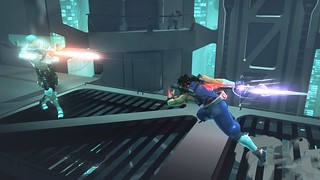
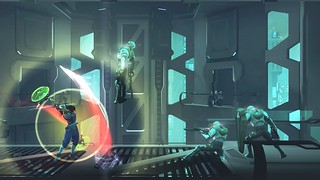
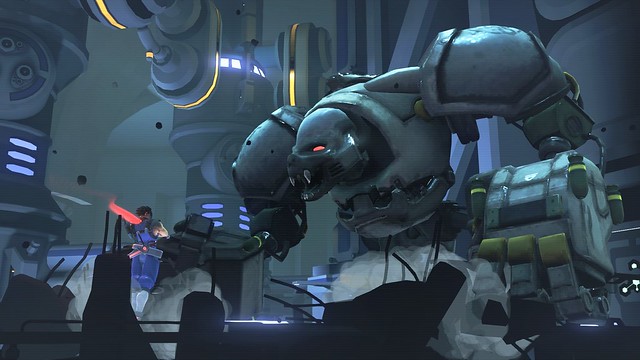
Click here to see the full gallery
Kazakh itself is laced with details both large and small — which are easy to miss with Hiryu leaping frantically from one location to another. Massive buildings rise up through the snow in the backdrop. Monuments stand rigid and gaze down with a menacing air. Citizens wait for trains in the station, and computer monitors flicker on their ceiling mounts. Hiryu sprints through homes, libraries, storage facilities, and palaces — all while avoiding enemy fire and cutting down his enemies.
But don’t linger on the sights for too long — Hiryu has a mission to complete, and Kazakh’s military is hell bent on stopping him. Fortunately for us, taking them on is a lot of fun, and gives players a lot of stuff to split apart with a glowing energy weapon.

